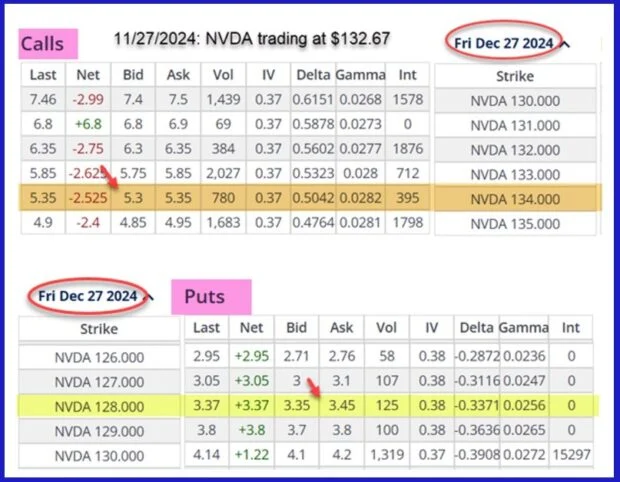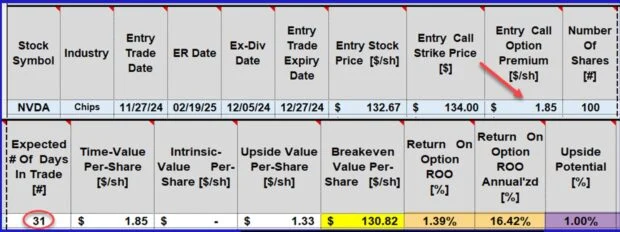The Collar Strategy Using the BCI Trade Management Calculator + A Sample Trade Video – June 16, 2025
The Collar Strategy is a covered call writing-like strategy where a protective put is added to the trade, thereby establishing a floor and a ceiling with a maximum gain and a maximum loss. This article with analyze a real-life example NVDIA Corp. (Nasdaq: NVDA) to demonstrate how to implement this strategy.
Uses for the collar
- Protection in a contract period to protect during an earnings report (I, typically, avoid ERs completely)
- Protection during bear & volatile market conditions
- Reducing risk during uncertain times (Brexit, Fed announcement, elections etc.)
- Protecting appreciated stocks
- Insurance when we can’t be near a computer to monitor portfolios
Entering the 3 Legs of a collar trade
- Long stock (buy the shares first)
- Short (covered) out-of-the-money call (ceiling)
- Long out-of-the-money protective put (floor)
NVDA collar option chain

- NVDA trading at $132.67
- The $134.00 call (ceiling) has a bid price of $5.30
- The $128.00 put (floor) has an ask price of $3.45
- The net premium that will be entered into the BCI Trade Management Calculator (TMC) is $1.85 ($5.30 – $3.45)- see red arrow below
Initial collar time-value calculations with the TMC

- Red circle: This is a 31-dqy trade, if taken through contract expiration
- Yellow cell: The breakeven price point is $130.82
- Brown cells: The 31-day initial time-value return is 1.39%, 16.42% annualized
- Purple cell: There is an additional opportunity of 1% share price appreciation
NVDA Collar Pros & Cons
Advantages
–Protects against catastrophic share loss below the $128.00 protective put strike
–Still results in a net option credit with an insurance policy
–Upside potential remains the same (1%)
–Sleep better at night?
Disadvantage
–Initial time-value return is reduced from 3.99%, 47.04% annualized to 1.39%, 16.42% annualized
Discussion points
- The collar strategy adds a protective put to our covered call trades
- Protects us against overwhelming share price decline
- Time-value returns will be lower than traditional covered call writing in exchange for the added protection
- Our collar trades can be managed by the BCI Trade Management Calculator (TMC)
- We do so, by deducting the put premium debit from the call premium credit
- We can establish both initial and final calculations using this spreadsheet
- The short call is the active management leg of the trade
Author: Alan Ellman